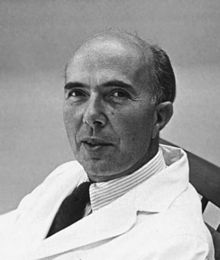Renato Dulbecco
| Renato Dulbecco | |
|---|---|

Dulbecco c.1966
|
|
| Born |
February 22, 1914 Catanzaro, Italy |
| Died | February 19, 2012 (aged 97) La Jolla, California |
| Residence | Imperia, Milan, La Jolla |
| Nationality | Italian, American |
| Fields | Virologist |
| Institutions | |
| Alma mater | University of Turin |
| Doctoral students | Howard Temin |
| Known for | Reverse transcriptase |
| Notable awards |
|
Renato Dulbecco (February 22, 1914 – February 19, 2012) was an Italian American, who won the 1975 Nobel Prize in Physiology or Medicine for his work on oncoviruses, which are viruses that can cause cancer when they infect animal cells. He studied at the University of Turin under Giuseppe Levi, along with fellow students Salvador Luria and Rita Levi-Montalcini, who also moved to the U.S. with him and won Nobel prizes. He was drafted into the Italian army in World War II, but later joined the resistance.
Dulbecco was born in Catanzaro (Southern Italy), but spent his childhood and grew up in Liguria, in the coastal city Imperia. He graduated from high school at 16, then moved to the University of Turin. Despite a strong interest for mathematics and physics, he decided to study medicine. At only 22, he graduated in morbid anatomy and pathology under the supervision of professor Giuseppe Levi. During these years he met Salvador Luria and Rita Levi-Montalcini, whose friendship and encouragement would later bring him to the United States. In 1936 he was called up for military service as a medical officer, and later (1938) discharged. In 1940 Italy entered World War II and Dulbecco was recalled and sent to the front in France and Russia, where he was wounded. After hospitalization and the collapse of Fascism, he joined the resistance against the German occupation.
...
Wikipedia
